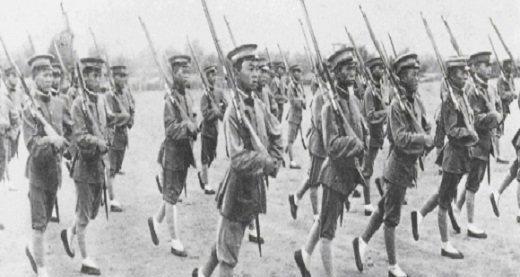The Survival Wisdom of the Beiyang Era (174): The death of a gentleman is inevitable.
In the chaotic world of Beiyang, in the obscure era when more than half of the illiterate people were illiterate, Xiu was a golden and shining high education. Among the Giants of Beiyang at that time, Wu Peifu started relatively late, so the generation was not high, and he began to join the army, Duan Qirui was already a Sanpin military attaché with real power in the Beiyang New Army, and was the right and left arm relied on by Yuan Shikai, the old man of the Beiyang Department, Feng Guozhang was also about to be promoted from the general office of the superintendent of camp affairs to the rank of Sipin, Cao Kun had graduated from the Tianjin Wubei Academy and became a deputy battalion commander among Yuan Shikai's personal soldiers, and Wu Peifu, who was twenty-four years old, was only a service soldier under his command. He was hastily involved in the Zhengrong era, in the Gengzi chaos experienced the fist people being harvested in front of the position in pieces, nie Shicheng, the supreme commander of the Qing army who sat directly under the command, was killed in battle, but the superior Qing army lost the land one after another, and he was already a regular army protector of the Qing court, and found that he could not protect anything from the commander to the Jiangshan, only the wandering scene.

Subsequently, Wu Peifu first changed his fate with culture, and then used culture to win the respect of Robe Ze. He would not know that on top of the Beiyang Temple, where only clothes were changed in ancient and modern times, heroes who did not talk about power and flexibility were only worthy of playing tragic roles, and it was also his stubborn traditional concept, although the rank of Beiyang warlords was not high, it still made Pao Ze respected. In the Zhiwan War, his reputation rose up, and in a round of criticism, he stubbornly put the "Cao Three Fools" who had the grace of knowing him to the top of the Beiyang, although he repeatedly opposed in his heart, but as a Confucian general with deep-rooted traditional concepts, he stubbornly respected the loyalty of Guan Yu and Yue Fei, and under the shackles of "the lord is subordinate to the inferior", he had to be led by the Nose of the Cao family, and eventually became the martyrdom of the Cao Temple, but the name of "Jade Shuai" or the title of "Second Brother Wu". It is definitely a true portrayal of the soul of the direct warlord.
However, Wu Peifu's traditional concept is not only stubborn to these rituals, but also more of an arrogant bone. He retreated bravely in a rapids, avoiding the luoyang military training, the temple of the end of the Beiyang dynasty, because his humility failed to increase his life. In his heyday, when the Northern Kingdom threw an olive branch, he scoffed; in the period of decline, the Japanese army tried to win over, and he categorically refused. A country seeker with an ice heart, alone in the Beiyang period. Like the Southern Army, the Anhui Army, and the Northwest Army, they all took foreign aid from others to strengthen themselves, and then turned their faces and did not recognize people, as long as Wu Peifu did not adhere to principles and was willing to "accommodate" a little, his own fate and even the fate of the entire Beiyang Group could be changed. Ask a warrior who rose up from the turbulent times of the late Qing Dynasty, who was able to overcome his desire for power at the time of public expectations, sacrifice fame and fortune without taking, and for the peak in front of him without climbing, the Beiyang era is unsurpassed.
In the end, Wu Peifu, who has fallen into the wilderness, lives in the Beiping Assorted Garden, a mansion given by the new warlord as a "nephew" with an unknown ancient tree twisted like a struggling flying clam. And Wu Peifu lived here in the north, still with his own guard, although the economic constraints still maintained the size of hundreds of people, the last soldiers of these direct warlords, in the gap between the north and the south and the Japanese army, the hat emblem was neither the logo of the Fengjun nor the Southern Army, but the word "Fuwei" was embedded in the whole body, and the scenery when changing the defense was eye-catching enough, and this fuwei general who had once been in Weijiahai had quietly returned to his hometown to sweep the tomb once because he was worried about the graves of his ancestors, but did not stay and chose to leave quietly. Sha Xiangyang, a local, believes: "At that time, he was already downcast, afraid that he would have no face to see his father and elder in his hometown." "Wu Peifu is indeed too stubborn in traditional concepts, that is a wind bone that would rather live up to himself than bear the people of the world, and there is a great sadness that Yuan Shikai, the old man of the Beiyang department, although tens of millions of people are looking forward to it."